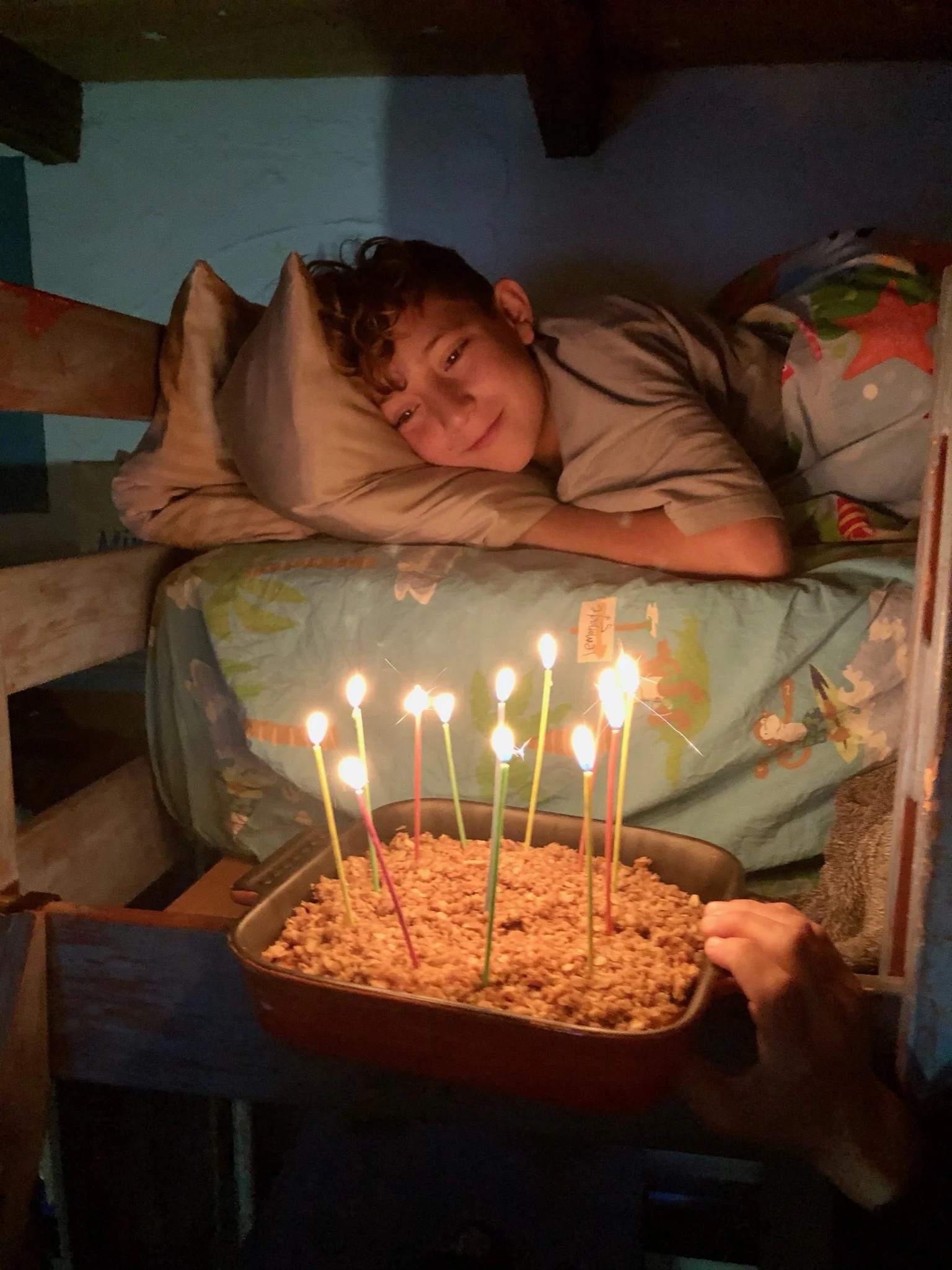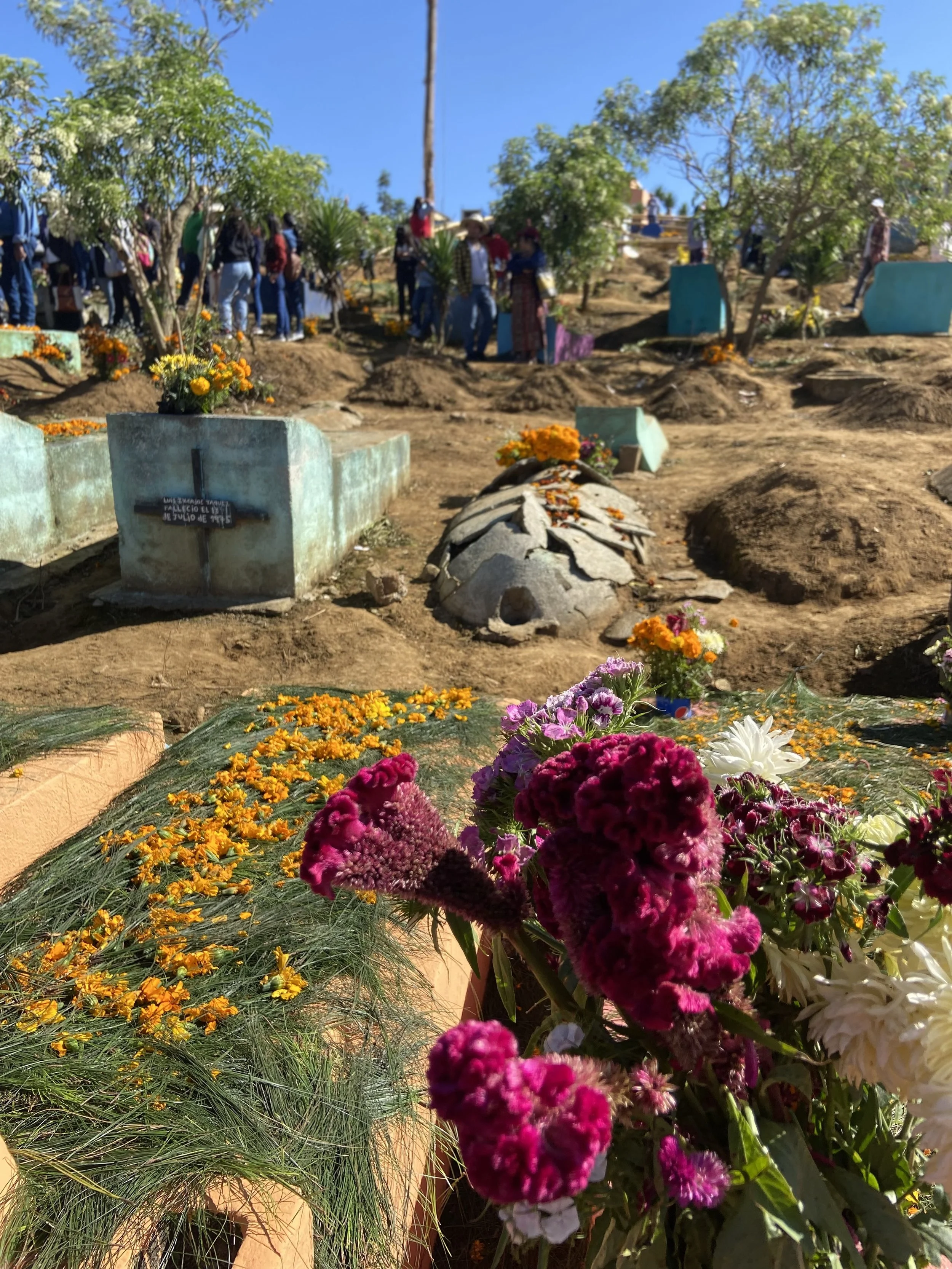Symbolic Rituals for Change…
Our family ritual is the birthday person is woken up by birthday cake, candles and singing.
Have you ever had a big change and not known how to process it? A big breakup, another loss… And you just can't see how to work your head and heart around the change? This is where rituals can help. By integrating rituals into your life, you have a steadying presence that connects you to a wider field, something to ground into. Something to believe in.
And sometimes you have to create them as you go. A close friend of mine was struggling to get over the breakup of his marriage. He would think he was over it, but then the moment he was in an intimate situation, his wife would occupy his head. Whenever he went to one of their favorite places, he couldn't walk in. He began to feel that time was not healing and was ready to listen to me about trying something that sounded a little airy-fairy.
I asked him to find an evening in which he could bring all of the important things (literal and figurative) he had been avoiding. I instructed him: “Don’t push them away. Invite them in. Bring Pink Floyd (their favorite band), your favorite shared food, and any other items or memories you have been avoiding. This is an offering to let go, not erase the memories. Once you stop pushing away, you give yourself space to let go. Think about the message. Think about what you loved, appreciated, and learned from and with your ex. Create an experience.” This is a ritual. We create them around death but not other kinds of modern separation. Imagine creating the space to mourn, to feel the good that existed, and not just the things you want to let go of. Imagine seeing the person in shades of grey and full of complexities, rather than as the bad bad man. When we stop with aversion, our bodies have the space to respond and heal from sadness.
I think it is time to not only embrace old rituals that resonate with us but to create in our families and our communities new rituals that meet our new needs. In working with couples, I have helped them sculpt new rituals to help create more connection amidst their busy, buzzing lives. With my individual clients, we have worked to create the habits and rituals that make life more rewarding every day. I have encouraged clients to build their ceremonies to let go of loved ones that have left their lives. In ancient times, our loved ones only left our lives through death. Maybe modern society needs to create some divorce rituals.
Why have rituals and ceremonies been deeply connected to the human experience for thousands of years? And why do people seek out symbolic experiences?
I think we need symbols and rituals to internalize life in a deeper way. Sometimes the words are too crude and don’t bring the emotion that a clean metaphor brings. And life brings surprises that we need to process in a deeper way that connects us with our community and loved ones. Rituals can be celebrations or mourning; they are about beginnings and endings; life and death; about the minutiae and the grand. Rituals imbue meaning into action. And ceremony into the void…
From the pagan culture to the religious, a ritual gave an important moment some more physical expression in the outer world.
In each culture, death is associated with rituals and customs to help people with the grieving process. Grief is a multi-faceted response to loss. Although conventionally focused on the emotional response to loss, it also has physical, cognitive, behavioral, social, and philosophical dimensions. Rituals offer people ways to process and express their grief. They also provide ways for the community to support the grieving. Mourning rituals have also been psychologically proven through studies to help ease the pain and burden of grief and connect others through a time of loss.
In society, we moved toward medicalized models of birth and death. We have moved further away from the physical realities and a disconnect has taken over. What emerged instead was a greater fear of death and the dead body. Medical advances extended control over death. Increasingly, death became hidden from public view. No longer familiar, death became way more threatening and scary.
The mourning traditions of earlier cultures prescribed precise patterns of behavior that facilitated the public expression of grief and provided support for those facing loss. In addition, they emphasized the continued maintenance of personal bonds with the dead. Grief was expressed in an open and unrestrained way that was cathartic and communally shared, very much in contrast with the modern emphasis on controlling one’s emotions and keeping grief private.
The ritual practices that surround death and mourning as rites of passage help individuals and their communities make sense of loss through a focus on continuity. Leaning into the culturally defined way, by using the same rituals as our ancestors did, society engages in traditions that connect with something enduring and eternal. Rituals make boundaries between life and death, the sacred and the profane, memory and experience, liveable and accessible. The dead seem less far away and less forgotten. Death itself becomes a more natural and familiar process.
But we don’t do rituals anymore. We have banned them from our busy lives. We have become ‘human doings’ instead of ‘humane beings’. But if we don’t engage in rituals anymore, what are the costs?
If rituals connect people with others and create community, then a lack of rituals makes us feel isolated and lonely.
If rituals help us connect with our emotions: fear and joy, then a lack of rituals means we lose the ability to create the connection. We suppress our emotions and find other ways to release them: addictions, violence, and consumerism.
If rituals connect us to tradition, then a lack of rituals implies we can’t put things into perspective. We don’t learn from stories of how our ancestors dealt with similar life events; we lack the language, the forms, and the tools to create a space in which we can deal with the complexity of humanity.
If rituals help us deal with the complexity of life, with both the light and the dark side of our humanity; then with a lack of rituals we are alienated from ourselves. We become disrupted.
We need rituals because they provide a powerful structure to release emotions, they help mourn endings, celebrate beginnings, and help us reconnect with ourselves and with the people around us. They affirm the complexity of life and open up a spiritual reality in which we feel held and secure.
To read more about rituals, check out my blogs Intentionality & Rituals of Connection and Rituals.
Celebration Rituals on The Day of The Dead in Guatemala.
Are you interested in working on your personal development? Are you looking for a life coach or a life consultant? Are you feeling stagnant? Do you want to jumpstart change?
My transformational approach is a process where awareness, alignment, and action work together as catalysts to create momentum for change.
*Awareness is knowing what you genuinely want and need.
*Alignment is the symmetry between our values and our actions. It means our inner and outer worlds match.
*Action is when you are conscious that what you say, do and think are in harmony with your values.
Together we build an understanding of what you want to accomplish, and delve deeply into building awareness around any thoughts and assumptions that you may already have. To truly transform your life, I will empower you to rethink what’s possible for you.
__
Learn more about my approach to life consulting and relationship coaching here or get in touch for your free 30-minute consultation here! Don’t forget to follow along @LilyManne on social for more regular updates!


